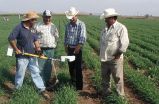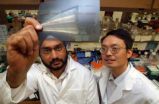(Press-News.org) A space flight by millions of microscopic worms could help us overcome the numerous threats posed to human health by space travel. The Caenorhabditis elegans (C. elegans) have also given experts an insight into how to block muscle degradation in the sick and elderly.
The worms — from The University of Nottingham — were flown into space onboard the Space Shuttle Atlantis. They spent 11 days in orbit onboard the International Space Station more than 200 miles above the earth.
Many of C. elegans' 20,000 genes perform the same functions as those in humans. Experts in human physiology from the School of Graduate Entry Medicine wanted to study the effectiveness of RNA interference (RNAi), a tried and tested technique which regulates gene expression in diseased tissue, and whether this technique could be employed to reduce or control the dramatic muscle loss experienced by astronauts during spaceflight.
The results of this research, published today (June 1 2011) in the journal PLoS ONE, have shown that RNAi, which is already the subject of more than a dozen clinical trials to target illnesses ranging from cancer to asthma, functions normally in space flight and could be used as a viable option to treat and control muscle degradation in spaceflight. Their discovery will not only be of interest to astronauts but will also help people who suffer from muscle wasting caused by illness and old age.
Dr Nathaniel Szewczyk from the Division of Clinical Physiology said: "It was really a quite straightforward experiment. Once the worms were in space the scientists onboard the International Space Station treated them with RNAi and then returned them to us for post flight analysis. These results are very exciting as they provide a valuable experimental tool for spaceflight research and clearly demonstrate that RNAi can be used effectively to block proteins which are needed for muscle to shrink."
During the flight a series of experiments were carried out by Japanese scientists onboard the International Space Station. When the flight samples were returned to Nottingham the results were analysed by Dr Timothy Etheridge, in the Division of Clinical Physiology.
Timothy Etheridge said: "We were very pleased that, given the numerous problems associated with conducting research in space, our experiments went as planned and allowed us to demonstrate that this form of gene therapy works effectively during spaceflight. The unexpected finding that RNAi can effectively block protein degradation in muscle in space was also a very welcome surprise."
The experiment was part of the Japanese CERISE payload and funded as parts of a $1m (£0.6m) United States National Institute of Health grant to investigate the genetic basis of muscle atrophy and a £0.5m Medical Research Council grant to investigate how physical forces prevent muscle wasting. The recently installed Kibo lab is being used for the study of biomedicine and material sciences making use of the weightless conditions experienced in orbit.
Biological experiments in space need life support — oxygen, temperature control and pressure — so competition for space on manned flights is fierce and in short supply.
The origins of Dr Szewczyk's worms can be traced back to a rubbish dump in Bristol. C. elegans often feed on bacteria that develop on decaying vegetable matter.
The paper is available at: http://dx.plos.org/10.1371/journal.pone.0020459
Microscopic worms could help open up travel into deep space
2011-06-03
ELSE PRESS RELEASES FROM THIS DATE:
Safer sex: Study examines sexual communication in transgender community
2011-06-03
A new study from North Carolina State University shows that talking about safer sex is a complicated process for individuals in the transgender community. The finding may help efforts to promote safer sex practices in a community facing high HIV rates – and also sheds light on broader questions related to safer sex for everyone.
"The main reason for this study is the fact that we're seeing evidence of devastatingly high HIV prevalence rates in the transgender community," says Dr. Kami Kosenko, an assistant professor of communication at NC State and lead author of the ...
Fraser Yachts Exclusive - Fairer Winds Expected this Summer
2011-06-03
As the Mediterranean prepares for the summer season the yacht brokerage market is looking fairly healthy in contrast to this quarter in recent years. Supporting this resurgence are the annual boat shows that are beginning to see increased interest and enquiries through their continued efforts.
Although all areas of the business are showing equal improvements this cannot be said to be spread across Fraser Yachts' entire network worldwide however with some regions recovering quicker than others it would seem.
Most recently interest appears to be concentrated in the ...
Cognitive impairment seen in preschool children with epilepsy
2011-06-03
A recent study has shown that cognitive impairment is evident early on in preschool children with epilepsy, consistent with results of similar studies in older children. Age of onset of first seizure is a significant predictor of cognitive impairment according to this study—the first to evaluate cognitive impairment in children age three to six. The report is available in Epilepsia, a journal published by Wiley-Blackwell on behalf of the International League Against Epilepsy (ILAE).
Epilepsy is characterized by recurrent seizures that range from mild staring spells to ...
The blame game in work-family conflict
2011-06-03
INDIANAPOLIS – When the demands of work and family conflict, is the job blamed, is the family role blamed or is blame placed on both? And what are the consequences?
A new study by Elizabeth M. Poposki, Ph.D., assistant professor of psychology in the School of Science at Indiana University-Purdue University Indianapolis, is the first to explore day-to-day experiences in attributing this type of blame. The work examines individual incidents of work-family conflict and tracks how blame for this conflict is attributed.
Only three percent of those surveyed blamed both work ...
Farmer networks hold key to agricultural innovation in developing countries, Stanford study finds
2011-06-03
New technologies can improve agricultural sustainability in developing countries, but only with the engagement of local farmers and the social and economic networks they depend on, say Stanford University researchers. Their findings are published in the May 23 online edition of the Proceedings of the National Academy of Sciences (PNAS).
"Most people tend to think that technology information flows to farmers through a direct pipeline from scientists, but that isn't true," said lead author Ellen McCullough, a former research fellow at Stanford's Program on Food Security ...
Cause and potential treatment found for cancer drug's kidney toxicity
2011-06-03
AUGUSTA, Ga. – Scientists may have a way to make the powerful cancer drug cisplatin less toxic to the kidneys and more effective against some cancers.
The chemotherapeutic agent used in combination with other drugs for a variety of cancers, results in kidney damage or failure in about 30 percent of users, although the mechanism has been unclear. The most physicians can do today to protect the kidneys is advise patients to drink more water.
The relatively simple, highly reactive compound tends to accumulate in the kidneys, said Dr. Navjotsingh Pabla, postdoctoral fellow ...
Iron key to brain tumor drug delivery
2011-06-03
Brain cancer therapy may be more effective if the expression of an iron-storing protein is decreased to enhance the action of therapeutic drugs on brain cancer cells, according to Penn State College of Medicine researchers.
Malignant glioblastoma multiforme is a deadly brain tumor for which no long-term effective cure exists. Because drugs in the blood do not pass from the blood vessels to the brain, effective amounts of chemotherapy drugs do not reach the tumor. Increasing dosages damage normal brain tissue and cause significant neurological damage. These dosages also ...
Children eat more vegetables when allowed to choose
2011-06-03
This release is available in French and Spanish.
A gesture as simple as allowing children to freely choose the vegetables they want to eat helps to increase the consumption of these foods in children, as University of Granada has found. Moreover, his work suggests that the bitter taste of calcium, present in vegetables such as spinach, collard greens, cabbage, onions, chard or broccoli, can be a factor negatively influencing children's consumption of vegetables.
To carry out this experimental study, the authors analyzed the main factors determining vegetable consumption ...
Building a better dam map
2011-06-03
Humans have been building reservoirs and dams for thousands of years. Over the past few decades, their construction has spiked as our need to harness water – critical in flood control, irrigation, recreation, navigation and the creation of hydroelectric power – has grown. And while dams and reservoirs have important benefits, they can also be disruptive and costly to both humans and the environment.
A close assessment of critical environmental and social tradeoffs associated with dams and reservoirs within the global river network has been impossible because the data ...
New type of MRSA in hospitalized patients probably of animal origin
2011-06-03
WASHINGTON, DC -- June 2, 2011 -- A distinctly new type of methicillin resistant Staphylococcus aureus (MRSA) that is not detected by traditional genetic screening methods has been discovered in patients in Irish hospitals according to research to be published in the journal Antimicrobial Agents and Chemotherapy. These findings provide significant insights into how new MRSA strains emerge and highlight the potential for the transmission of infectious agents from animals to humans.
MRSA is a significant cause of hospital- and community-acquired infection worldwide. MRSA ...


